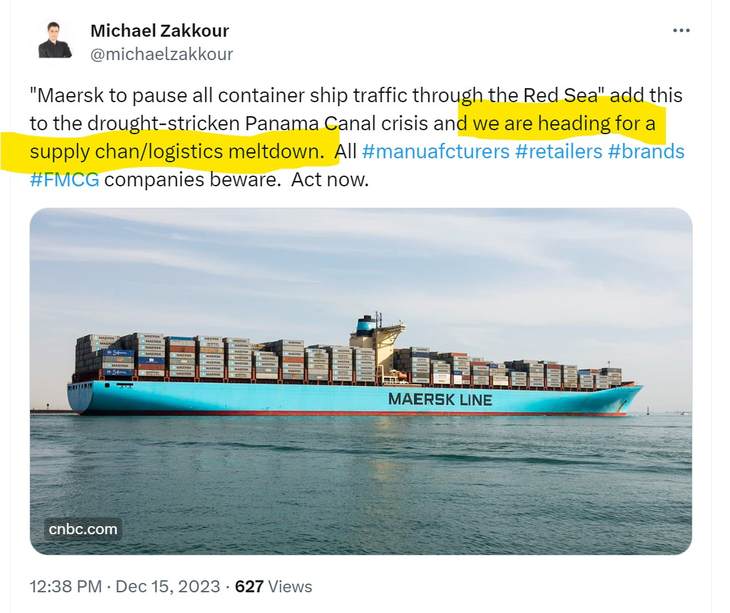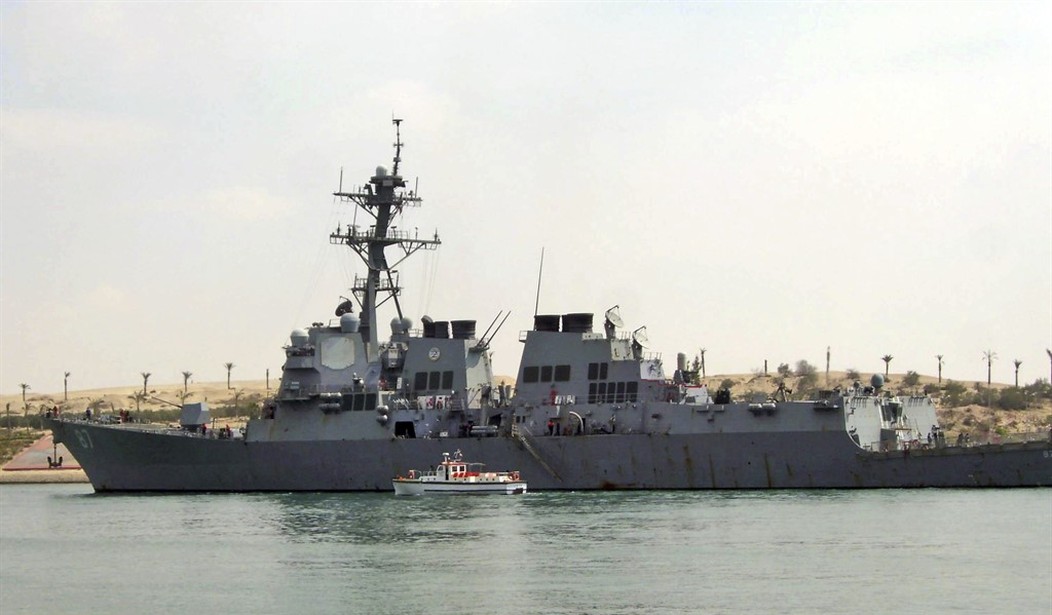Well, dang.
Two More Ships Struck By Houthi Missiles As Maersk Diverts All Tankers From Red Sea https://t.co/NCENcSRboW
— zerohedge (@zerohedge) December 15, 2023
This couldn’t come at a worse time.
Attacks from Houthi-controlled Yemen struck two Liberian-flagged ships in the Bab al-Mandab Strait on Friday, a U.S. defence official said, underlining the threat to vessels in shipping lanes being targeted by the Iran-aligned group.
Danish shipping company A.P. Moller-Maersk (MAERSKb.CO) said it would pause all container shipments through the Red Sea until further notice. German container line Hapag Lloyd said it was considering a similar move.
A projectile, believed to be a drone, struck one of the Liberian-flagged vessels, the German-owned Al Jasrah, causing a fire but no injuries, the U.S. official said.
Two ballistic missiles were fired in the second attack, one of which struck a vessel, causing a fire which the crew was working to extinguish, the official said.
A U.S. Navy destroyer was on its way to aid the vessel, the official said, without naming the vessel.
German shipping company Hapag-Lloyd really didn’t waste any time pulling the plug on their vessels running the route either.
Hope there are no supply chain disruptions due to this.
— Alok (@Taur19) December 15, 2023
As for disruptions in supply chains, stand-by for that. Many of the vessels transiting the Suez are already part of supply chain disruptions because of the drought afflicting the Panama Canal.
…The Panama Canal is popular for East Coast trade because it is faster than other options. The shipping time for ocean cargo from Shenzhen, China, to Miami, Florida, using the Suez Canal takes 41 days. Traveling through the Panama Canal takes only 35 days.
The other problem is going to be geopolitical. When the only default short-cut is the Suez Canal and…by the way – how’s that region doing there now?
One fellow politely calls them “significant geopolitical headwinds.”
…Containerships have priority in crossing the canal due to their contracts. The most impacted vessel types are wet bulk and dry bulk vessels, Ashiq said.
“This may start a shift in bookings for Transpacific freight destined to the U.S. East and Gulf through the Suez Canal, which is located in a region with significant geopolitical headwinds,” said Paul Brashier, vice president of drayage and intermodal at ITS Logistics.
They are getting a face-full of geopolitical headwinds right about now, courtesy of Yemeni Houthis and their penchant for rocket fire. And there doesn’t seem to be anything or anyone stopping them at the moment.
If every rocket launch had been followed by that site becoming a smoking hole 10 minutes later, we might not be in this pickle right now. As it is, all that’s happening is the US Navy sends a cruiser/destroyer to chase ghosts after the fact.
And where are the Europeans in all this? It’s mostly their stuff our Navy’s protecting.
Even without the problems in the Panama Canal, the Suez is a a major point of entry into the Mediterranean for much of Europe’s liquid natural gas and other freight. On the outgoing side, a fair portion of the world’s oil and LNG makes its way to deliveries through the Suez and Red Sea.
It's not like anyone uses the Red Sea anyway pic.twitter.com/k33TStNrjq
— zerohedge (@zerohedge) December 15, 2023
And the Suez has been doing box office business lately.
Suez Canal's November 2023 report: Revenues surge to $854.7M (up 20.3%), 2264 ships (up 4.3%), and net tonnage hits 135.5M tons (up 8.2%). Chairman Osama Rabie announces fee increases from mid-January 2024: 15% for specific vessels, 5% for others. #SuezCanal 🚢💰 pic.twitter.com/18xkMKVS79
— Business Today Egypt (@BTEgypt_Mag) December 14, 2023
One would imagine the EU has to be panicking at the thought that ships might be pulling to the side or just plain turning around and bugging out.
What to do, what to do – and something has to be done because this is going to quickly get out of hand, and not just from a military standpoint. As the tweet says, shipping rates “to the moon,” along with the cost of everything else.
Do the various European navies have enough large warships to carry sufficient anti-air missiles to help? Do they have enough stockpiles of replacement missiles on hand?
Or by “western world, needs to take action” you mean the US navy needs to send in more of its ships?
— John Ʌ Konrad V (@johnkonrad) December 14, 2023
If ships are forced by these significant “geopolitical headwinds” – aka rocket-firing-Iranian-backed-banditos – to go around the Cape of Good Hope and Cape Horn, it will add (as brother Bingley calculates for me) 10 to 12 days of transit time to any voyage. Time is money, and that extra time on the water has to be paid for both in additional fuel costs (and don’t forget the new EU carbon emissions taxes that will add almost 50% of the fuel costs to the bill in 2024), not to mention the financing involved with whoever is paying for the load and the shipping. At the current interest rates, another week and a half of travel, plus interest, ups their portion of expenses considerably. Insurance is also a factor.
There is no way the impact of a shipping curtailment thru the Suez and Red Sea can be overstated, again especially considering the Panama Canal is not an option to divert to.
The Red Sea plays a VITAL role in global shipping.
Here’s everything you need to know about the critical role the Red Sea plays in your life 👇
…Fast Forward to 2023 and the Suez Canal witnesses the transit of 50-60 vessels daily, accounting for about 19,000 vessels annually, including nearly 30% of global container traffic.
…In the first half of 2023, about 12% of total seaborne-traded oil and 8% of worldwide LNG trade passed through the Red Sea.
…If shipping lanes have to be rerouted due to these attacks, the global supply chain of numerous goods and industries could be drastically affected.
This could include skyrocketing and bottoming of prices of numerous industries and sectors – depending where they fall in the supply chain.
The anticipated rise in shipping costs was already being reflected in stock prices. Just that fast.
Ocean containers are not going to be as cheap as they have been for most of this year. Obviously this is awful but it will allow SSL to increase rates or add in surcharges.
— CoyoteJack (@3PL_Yote) December 15, 2023
There’s a question about how long the companies will avoid the area, too, considering the financial burden. It’s never been an extended period in prior flare-ups, simply because they have to make a pragmatic choice of risk vs outlay.
…It’s not certain that Maersk Tankers’ ships actually will avoid the Red Sea in practice or for how long. In the past, large tanker companies have veered away from the area for short periods of time, but the extra fuel cost and cargo delays have tended to make such deviations temporary.
A SUPPLY CHAIN MELTDOWN

The US is trying to pull together a multi-nation task force, and resorting to harsh language in the meantime.
#StopThatRightNow
…The U.S. Special Envoy for Yemen, Tim Lenderking, said on Thursday that Washington wanted the “broadest possible” maritime coalition to protect ships and signal to the Houthis that attacks would not be tolerated.
Iran warned that the proposed multi-national naval force would face “extraordinary problems” and nobody “can make a move in a region where we have predominance”.
If only someone had the hashtag to ruin Iran’s bowl of Cheerios. How different things might be.








Join the conversation as a VIP Member